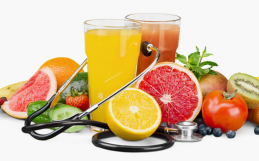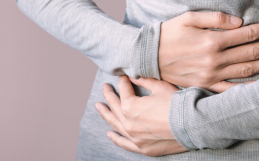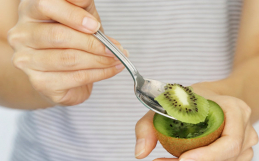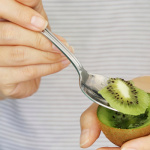Contents:
1. Kiwi in the 1st trimester of pregnancy
2. Kiwi in the 2nd trimester of pregnancy
3. Kiwi in the 3rd trimester of pregnancy
4. Side effects of kiwi during pregnancy
A balanced and varied diet is always important to protect our health, but it is even more so for a woman during pregnancy. When we speak of nutrition during pregnancy, we often only focus on the restrictions: avoiding caffeine, giving up smoking for those who are smokers, avoiding alcohol, not eating raw meat and fish, avoiding cured meats, etc.
Pregnancy is certainly a delicate phase in the life of a woman and it is important, during this time, to maintain a balanced diet.
- This is why, in a pregnant woman’s diet fresh fruit and vegetables must always be present. In fact, seasonal fruit and vegetables provide significant micro-nutrients, such as vitamins, minerals, as well as anti-oxidants and fibres.
- It is therefore essential, for pregnant women to eat two or three servings of fruit daily (300-450 grams per day). In these cases, a particularly interesting fruit is the kiwi, thanks to its content of vitamin C, B group vitamins, vitamins E and K and minerals like Potassium and Iron.
Kiwi in the 1st trimester of pregnancy
During the first three months of pregnancy, the nutrients found in kiwi beneficial to woman and her baby are:
- Folic acid (Vitamin B9). When planning a pregnancy and during the first trimester, folic acid supplements are recommended. Since the most common and serious birth defects appear specifically between conception and the 8th-12th week of pregnancy, it is important to introduce vitamins at least one month before conception and to continue taking them for the entire first trimester. For this reason, adding two kiwi, green, gold or red, containing a significant amount of folates, in the everyday diet of a future mother is surely beneficial to the woman and her baby.
- Vitamin C. Ascorbic acid (vit. C) is vital for the development of neurotransmitters in the foetus, which are essential for correct brain function. Furthermore, foods rich in vitamin C, like kiwi, protect the future mother from the dangerous effect of free radicals thanks to their anti-oxidant action. A serving of 150 g of green kiwi covers more than 100% of the population reference intake (PRI) of vitamin C for pregnant women (NRV, Nutrient Reference Values, from the DRV EFSA 2019). Vitamin C is good for pregnant women also because it helps with the absorption of iron in foods, a particularly important mineral to prevent anaemia (during and also after pregnancy). Good levels of iron are obviously good also for the baby.

- Calcium. Calcium is essential for the development of teeth and bones, and much more. Correct amounts of calcium are very important also for the development of the baby’s muscles and heart, as well as for the mother’s body in general: for this reason during pregnancy calcium requirements increase from 1000 mg to 1200 mg per day. When a pregnant woman does not get enough calcium from food, her body takes it from the bones, thus reducing bone mass (a potentially dangerous factor for when the woman goes into menopause, a condition that leads to an additional decrease in bone mass, increasing the risk of osteoporosis). It is therefore important to not avoid milk and dairy products, main sources of calcium easily absorbed by the body, but, in cases of lactose intolerance or if vegetable sources of calcium are preferred, it is good to remember that a serving of a 150 g of kiwi contains 38 mg of calcium (CREA, Centro di Ricerca Alimenti e Nutrizione database).
Kiwi in the 2nd trimester of pregnancy
In the second trimester of pregnancy, the nutrients of kiwi that are particularly beneficial to the future mother are:
- Dietary fibres. Thanks to the high fibres content, kiwi can help maintain intestinal regularity and contrast constipation. Pregnancy, in fact, can cause serious intestinal problems for women, especially constipation because of the higher hormone levels which slow down digestion and relax intestinal muscles. A serving of 150 g of gold kiwi covers approximately 16% of the daily intake (AI) of recommended fibre for pregnant women (SIGO 2018 – Società Italiana di Ginecologia e Ostetricia).
- Potassium and Magnesium. During pregnancy, the daily nutritional requirement of these important minerals increases considerably: in fact, an increase that varies between 25% and 50% compared to normal requirements is estimated. Potassium and magnesium help pregnant women also keep various changes to the body under control and they become allies in facilitating proper growth of the baby and in reducing the risks of premature birth. In kiwi there is mainly potassium, which during pregnancy improves muscular activity, including that of the heart and the blood, it ensures a more stable mood, reduces the annoying sensation of weariness and fatigue and it is useful also to contrast the early signs of intestinal irregularity, which appear in this phase. A serving of 150 g of green kiwi covers approximately 17% of the daily intake (AI) of recommended potassium for pregnant women (NRV, Nutrient Reference Values, from the DRV EFSA 2019).

Kiwi in the 3rd trimester of pregnancy
In the last trimester of pregnancy, the kiwi promotes the good health of the future mother because it contains:
- Energy and healthy sugars. In this trimester, it is necessary to pay particular attention to gestational diabetes. This is a type of diabetes that may appear from the 5th-6th month of pregnancy and, usually, it disappears with the delivery, but it could create consequences for the baby. Usually, pregnant women are told to avoid simple sugars (e.g. desserts and sugar in general) and to eat fruit with a low glycaemic index. Kiwi, thanks to their high water content, have a glycaemic index lower than most other fruits: 100 g of kiwi contain the equivalent of 1 teaspoon of glucose. This means that the fruit will not significantly increase sugar levels in the blood, especially when eaten on a full stomach, at the end of a meal. It is sweet to the taste and can satisfy the future mother’s need for sweet food.
- Vitamin K. This vitamin ensures the correct functioning of an enzyme that allows the synthesis of several proteins involved in blood clotting and favours healing of injuries. Vitamin K carries out a role of primary importance for the health of the heart and circulatory system, since it reduces the risk of calcification in arteries and of the atherosclerotic plaque (arteriosclerosis). Additionally, moving the calcium from the vessels and the soft tissues to the bones, it contributes to maintaining the skeleton healthy. A 100 g serving of kiwi contains approximately 40 µg of vitamin K. The levels of vitamin K are increasingly important as the delivery date gets closer.

Side effects of kiwi during pregnancy
If you have never had problems with kiwi before pregnancy, it is rather likely that you can continue to enjoy them also throughout pregnancy. Rarely, though, some women may develop an allergy to kiwi after having eaten it (with the onset of itching or skin rash). This takes place because of a cross-reactivity (the association of two or more allergies); in fact, anyone who is allergic to kiwi is very likely also allergic to pollen or latex. Kiwi contains molecules associated with the so-called “latex-fruit syndrome” and, in case of allergy to latex, it is recommended to be careful about eating this fruit.
Scientific collaboration: Dott.ssa Raffaella Cancello, Nutritional Researcher, Department of Medical Sciences and Rehabilitation specialised in endocrine-metabolic disorders, Research Laboratory in Nutrition and Obesity, IRCCS-Istituto Auxologico Italiano (Scientific Institute for Research, Hospitalization and Health Care), Milan
Published works: https://pubmed.ncbi.nlm.nih.gov/?term=Raffaella+Cancello
Essential bibliography:
- Wilson R, Willis J, Gearry RB, Hughes A, Lawley B, Skidmore P, Frampton C, Fleming E, Anderson A, Jones L, Tannock GW, Carr AC. SunGold Kiwifruit Supplementation of Individuals with Prediabetes Alters Gut Microbiota and Improves Vitamin C Status, Anthropometric and Clinical Markers. Nutrients. 2018 Jul 12;10(7):895. doi: 10.3390/nu10070895. PMID: 30002355; PMCID: PMC6073280.
- Mishra S, Edwards H, Hedderley D, Podd J, Monro J (2017) Kiwifruit non-sugar components reduce glycaemic response to co-ingested cereal in humans. Nutrients. https://doi.org/10.3390/nu9111195
- Rush E, Drummond LN (2009) The glycaemic index of kiwifruit. N Z Kiwifruit J 192(May/June):29–33
- Monro J, Bentley-Hewitt K, Mishra S. Kiwifruit Exchanges for Increased Nutrient Richness with Little Effect on Carbohydrate Intake, Glycaemic Impact, or Insulin Response. Nutrients. 2018 Nov 8;10(11):1710. doi: 10.3390/nu10111710. PMID: 30413045; PMCID: PMC6265741.
- Monro JA. Kiwifruit, carbohydrate availability, and the glycemic response. Adv Food Nutr Res. 2013;68:257-71. doi: 10.1016/B978-0-12-394294-4.00014-6. PMID: 23394992.






